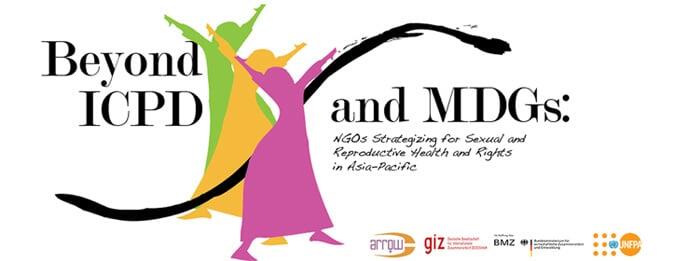KUALA LUMPUR – Around 100 delegates from civil society organizations from 31countries across the Asia-Pacific region, gathered from 2-5 May at a meeting organised by the Asia Pacific Resource and Research Centre for Women (ARROW) to build strategies to ensure regional influence from civil society and youth on the next round of global development goals.
Discussions were focused on securing human rights through improved access to sexual and reproductive health services and empowerment of women and young people. Supported by the German government and UNFPA, the United Nations Population Fund, ‘Beyond ICPD and MDGs’ examined latest evidence on linkages between sexual and reproductive health issues and issues such as climate change, migration, food security, and universal access to health and human rights.
The meeting also provided crucial space for civil society to build strategies to engage in regional and international processes that aim to provide analysis of progress and recommendations for future global development goals, particularly the implementation of the programme of the International Conference on Population and Development (ICPD) beyond 2014.
The diversity of issues affecting communities across Asia-Pacific, and the specific challenges and opportunities that these create for development and planning were highlighted during the sessions. As a region, Asia-Pacific includes nations with over 1 billion population to island nations of 100,000. The region boasts some of the fastest developing economies in the world, but is also home to two thirds of the world’s poor. Forty two per cent of the world’s maternal deaths are in Asia-Pacific.
Speaking at the event, UNFPA’s Kwabena Osei Danquah, Executive Coordinator of the ICPD Beyond 2014 Secretariat, said, “Some of the young people here today were only babies, when their governments committed to creating a better future for them at the International Conference for Population and Development in 1994. While policies and developments since then have changed the world they grew up in, what we have heard here – and in other regions taking part in this consultation process – is that there is still much to be done to deliver on the promise of ICPD. Delegates have shared experiences and evidence that indicate that progress on the promises on women’s equality and equity, their access to decision making and universal access to reproductive health as part of the human rights agenda is still uneven and in many areas insufficient.”
Over the next two years the international community will be focused on a review of progress towards Millennium Development Goals (MDGs), as well as an analysis of progress, gaps and challenges on the Programme of Action of ICPD. Together, these two reviews will influence global development priorities and policies for the next generation.
Dr Subha Sri , an obstetrician-gynaecologist working in Tamil Nadu, India for a social education programme run by and for Dalit women, highlighted the importance of regional forums such as this for ensuring that the voices of grassroots, marginalized women she works with are projected into the centre of development debates.
"Meetings like this are crucial. The spaces for getting those voices out are shrinking. ICPD in 1994 had lots of grassroots level engagement work. Lots of money was invested in that, millions of it from private sources. Those funds just aren’t available this time around. In this kind of environment, gathering together as civil society and looking at how we can work together to put sexual and reproductive health and rights on the agenda – not only of ICPD, but also the MDG review and of Rio +20 – is crucial to getting grassroots voices into the debate.”
Specific outcomes from the Kuala Lumpur meeting include a call on governments and international agencies to join with civil society to deliver 12 specific actions to ‘revitalise the sexual and reproductive health and rights agenda for sustainable development in the region’, drawing from the commitments made in the Programme of Action of ICPD and MDGs.
Delegates also proposed a regional civil society network focused on sustainable development and sexual and reproductive health and rights. Young people will have their own space within that network to ensure issues relevant to adolescents and young people are given a higher profile within the development debate.
For more information, please contact:
Anita Wiseman, wiseman@unfpa.org


